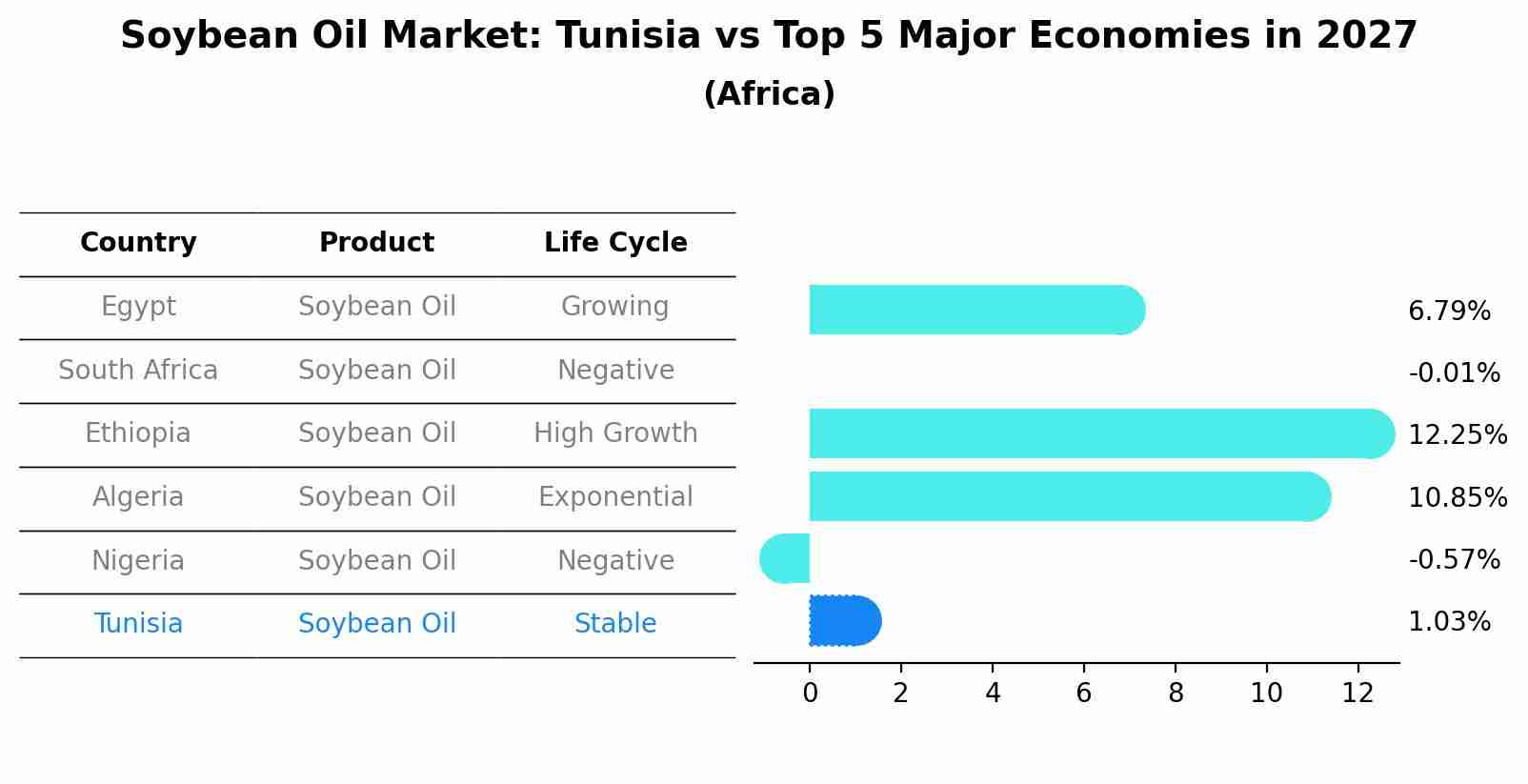Tunisia Soybean Oil Market Outlook | Companies, COVID-19 IMPACT, Analysis, Growth, Forecast, Share, Value, Trends, Size, Industry & Revenue
| Product Code: ETC385074 | Publication Date: Aug 2022 | Updated Date: Jul 2025 | Product Type: Market Research Report | |
| Publisher: 6Wresearch | Author: Bhawna Singh | No. of Pages: 75 | No. of Figures: 35 | No. of Tables: 20 |
Tunisia Soybean Oil Market Size Growth Rate
The Tunisia Soybean Oil Market is likely to experience consistent growth rate gains over the period 2025 to 2029. From 0.65% in 2025, the growth rate steadily ascends to 1.28% in 2029.

Soybean Oil Market: Tunisia vs Top 5 Major Economies in 2027 (Africa)
By 2027, the Soybean Oil market in Tunisia is anticipated to reach a growth rate of 1.03%, as part of an increasingly competitive Africa region, where Egypt remains at the forefront, supported by South Africa, Ethiopia, Algeria and Nigeria, driving innovations and market adoption across sectors.

Tunisia Soybean Oil Market Synopsis
The Tunisia soybean oil market is experiencing steady growth driven by increasing consumer awareness of the health benefits associated with soybean oil consumption. The market is primarily dominated by imports due to limited domestic production capacity. Key players in the market include international brands as well as local manufacturers. The demand for soybean oil in Tunisia is expected to further rise due to the growing trend towards healthy cooking oils and the expanding food processing industry. However, challenges such as fluctuating prices of raw materials and competition from other vegetable oils may impact market growth. Overall, the Tunisia soybean oil market presents opportunities for both domestic and international players to capitalize on the increasing demand for this versatile cooking oil.
Tunisia Soybean Oil Market Trends
In the Tunisia soybean oil market, there is a growing trend towards healthy cooking oils, with consumers increasingly seeking out products that are low in saturated fats and high in unsaturated fats like soybean oil. This shift is driven by a rising awareness of the health benefits associated with consuming such oils, including improved heart health and overall well-being. Additionally, there is a growing demand for locally produced soybean oil, as consumers prioritize supporting domestic agriculture and reducing their carbon footprint. Manufacturers are also focusing on sustainable sourcing practices and transparent labeling to cater to the environmentally conscious consumer segment. Overall, the Tunisia soybean oil market is witnessing a shift towards healthier, locally sourced, and sustainably produced products in line with global health and environmental trends.
Tunisia Soybean Oil Market Challenges
In the Tunisia Soybean Oil Market, there are several challenges that impact the industry. One major challenge is the country`s dependence on imported soybeans to produce soybean oil, leading to vulnerability to fluctuations in international prices and exchange rates. Additionally, competition from other edible oils, such as olive oil which is a staple in Tunisian cuisine, poses a challenge for soybean oil to gain market share. Furthermore, factors like limited domestic production, inadequate infrastructure, and varying consumer preferences towards healthier oils also hinder the growth of the soybean oil market in Tunisia. Overcoming these challenges would require strategic initiatives such as increasing domestic soybean cultivation, investing in processing technology, addressing consumer education regarding the benefits of soybean oil, and exploring export opportunities to diversify the market.
Tunisia Soybean Oil Market Investment Opportunities
Investment opportunities in the Tunisia soybean oil market include expansion of production capacity, introduction of advanced processing technologies to improve efficiency and quality, development of sustainable sourcing practices to meet growing consumer demand for eco-friendly products, and diversification of product offerings to cater to various market segments. Additionally, investing in marketing and distribution channels to increase market penetration and enhance brand visibility can also be beneficial. With the rising health consciousness among consumers and the increasing use of soybean oil in various food products and industrial applications, the Tunisia soybean oil market offers potential for long-term growth and profitability for investors looking to capitalize on the country`s expanding agricultural sector and growing demand for edible oils.
Jordan Agar Market Government Policies
The government of Tunisia has implemented policies to support the growth of the soybean oil market in the country. These policies include providing subsidies to local farmers to increase soybean production, promoting research and development in the soybean industry, and offering incentives to encourage investment in soybean oil processing facilities. Additionally, the government has implemented import tariffs and restrictions to protect the local soybean oil market from foreign competition. These policies aim to boost domestic production, reduce reliance on imports, and enhance food security in Tunisia through the development of a self-sufficient soybean oil industry.
Tunisia Soybean Oil Market Future Outlook
The future outlook for the Tunisia Soybean Oil Market appears promising due to increasing consumer awareness of the health benefits associated with soybean oil, such as its high levels of unsaturated fats and omega-3 fatty acids. The market is expected to witness steady growth driven by factors such as the rising demand for healthier cooking oils and the growing popularity of plant-based diets. Additionally, the government`s initiatives to promote domestic soybean production and reduce reliance on imports are likely to further boost the market. However, challenges such as fluctuating prices of raw materials and competition from other vegetable oils may impact the market`s growth trajectory. Overall, with the right strategies in place, the Tunisia Soybean Oil Market is poised for expansion in the coming years.
Key Highlights of the Report:
- Tunisia Soybean Oil Market Outlook
- Market Size of Tunisia Soybean Oil Market, 2021
- Forecast of Tunisia Soybean Oil Market, 2031
- Historical Data and Forecast of Tunisia Soybean Oil Revenues & Volume for the Period 2018 - 2031
- Tunisia Soybean Oil Market Trend Evolution
- Tunisia Soybean Oil Market Drivers and Challenges
- Tunisia Soybean Oil Price Trends
- Tunisia Soybean Oil Porter's Five Forces
- Tunisia Soybean Oil Industry Life Cycle
- Historical Data and Forecast of Tunisia Soybean Oil Market Revenues & Volume By End-Use for the Period 2018 - 2031
- Historical Data and Forecast of Tunisia Soybean Oil Market Revenues & Volume By Food for the Period 2018 - 2031
- Historical Data and Forecast of Tunisia Soybean Oil Market Revenues & Volume By Feed for the Period 2018 - 2031
- Historical Data and Forecast of Tunisia Soybean Oil Market Revenues & Volume By Industrial for the Period 2018 - 2031
- Tunisia Soybean Oil Import Export Trade Statistics
- Market Opportunity Assessment By End-Use
- Tunisia Soybean Oil Top Companies Market Share
- Tunisia Soybean Oil Competitive Benchmarking By Technical and Operational Parameters
- Tunisia Soybean Oil Company Profiles
- Tunisia Soybean Oil Key Strategic Recommendations
Frequently Asked Questions About the Market Study (FAQs):
- Single User License$ 1,995
- Department License$ 2,400
- Site License$ 3,120
- Global License$ 3,795
Search
Thought Leadership and Analyst Meet
Our Clients
Related Reports
- South Africa Stationery Market (2025-2031) | Share, Size, Industry, Value, Growth, Revenue, Analysis, Trends, Segmentation & Outlook
- Afghanistan Rocking Chairs And Adirondack Chairs Market (2026-2032) | Size & Revenue, Competitive Landscape, Share, Segmentation, Industry, Value, Outlook, Analysis, Trends, Growth, Forecast, Companies
- Afghanistan Apparel Market (2026-2032) | Growth, Outlook, Industry, Segmentation, Forecast, Size, Companies, Trends, Value, Share, Analysis & Revenue
- Canada Oil and Gas Market (2026-2032) | Share, Segmentation, Value, Industry, Trends, Forecast, Analysis, Size & Revenue, Growth, Competitive Landscape, Outlook, Companies
- Germany Breakfast Food Market (2026-2032) | Industry, Share, Growth, Size, Companies, Value, Analysis, Revenue, Trends, Forecast & Outlook
- Australia Briquette Market (2025-2031) | Growth, Size, Revenue, Forecast, Analysis, Trends, Value, Share, Industry & Companies
- Vietnam System Integrator Market (2025-2031) | Size, Companies, Analysis, Industry, Value, Forecast, Growth, Trends, Revenue & Share
- ASEAN and Thailand Brain Health Supplements Market (2025-2031) | Strategy, Consumer Insights, Analysis, Investment Trends, Opportunities, Growth, Size, Share, Industry, Revenue, Segments, Value, Segmentation, Supply, Forecast, Restraints, Outlook, Competition, Drivers, Trends, Demand, Pricing Analysis, Competitive, Strategic Insights, Companies, Challenges
- ASEAN Bearings Market (2025-2031) | Strategy, Consumer Insights, Analysis, Investment Trends, Opportunities, Growth, Size, Share, Industry, Revenue, Segments, Value, Segmentation, Supply, Forecast, Restraints, Outlook, Competition, Drivers, Trends, Demand, Pricing Analysis, Competitive, Strategic Insights, Companies, Challenges
- Europe Flooring Market (2025-2031) | Outlook, Share, Industry, Trends, Forecast, Companies, Revenue, Size, Analysis, Growth & Value
Industry Events and Analyst Meet
Whitepaper
- Middle East & Africa Commercial Security Market Click here to view more.
- Middle East & Africa Fire Safety Systems & Equipment Market Click here to view more.
- GCC Drone Market Click here to view more.
- Middle East Lighting Fixture Market Click here to view more.
- GCC Physical & Perimeter Security Market Click here to view more.
6WResearch In News
- Doha a strategic location for EV manufacturing hub: IPA Qatar
- Demand for luxury TVs surging in the GCC, says Samsung
- Empowering Growth: The Thriving Journey of Bangladesh’s Cable Industry
- Demand for luxury TVs surging in the GCC, says Samsung
- Video call with a traditional healer? Once unthinkable, it’s now common in South Africa
- Intelligent Buildings To Smooth GCC’s Path To Net Zero


















